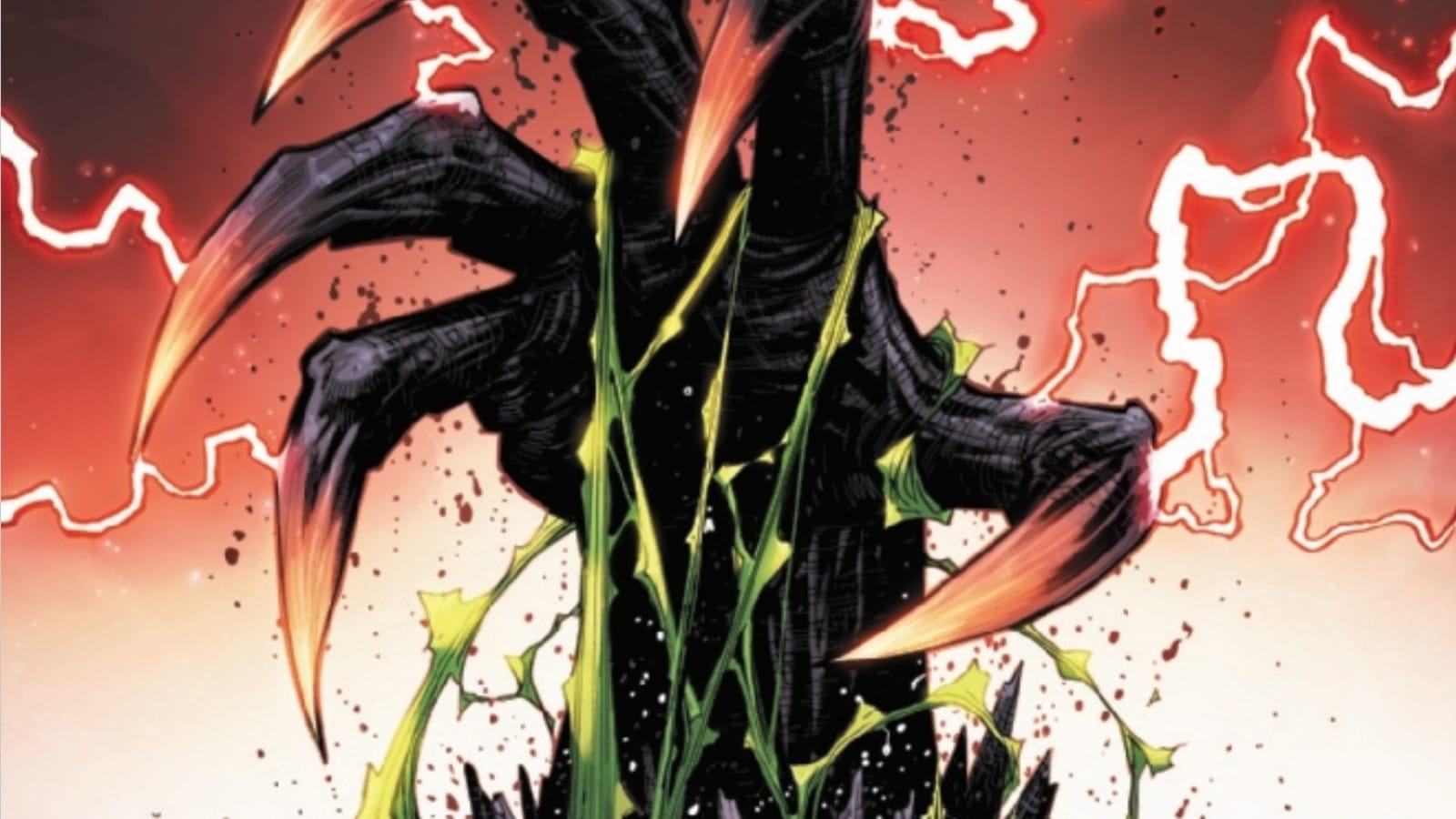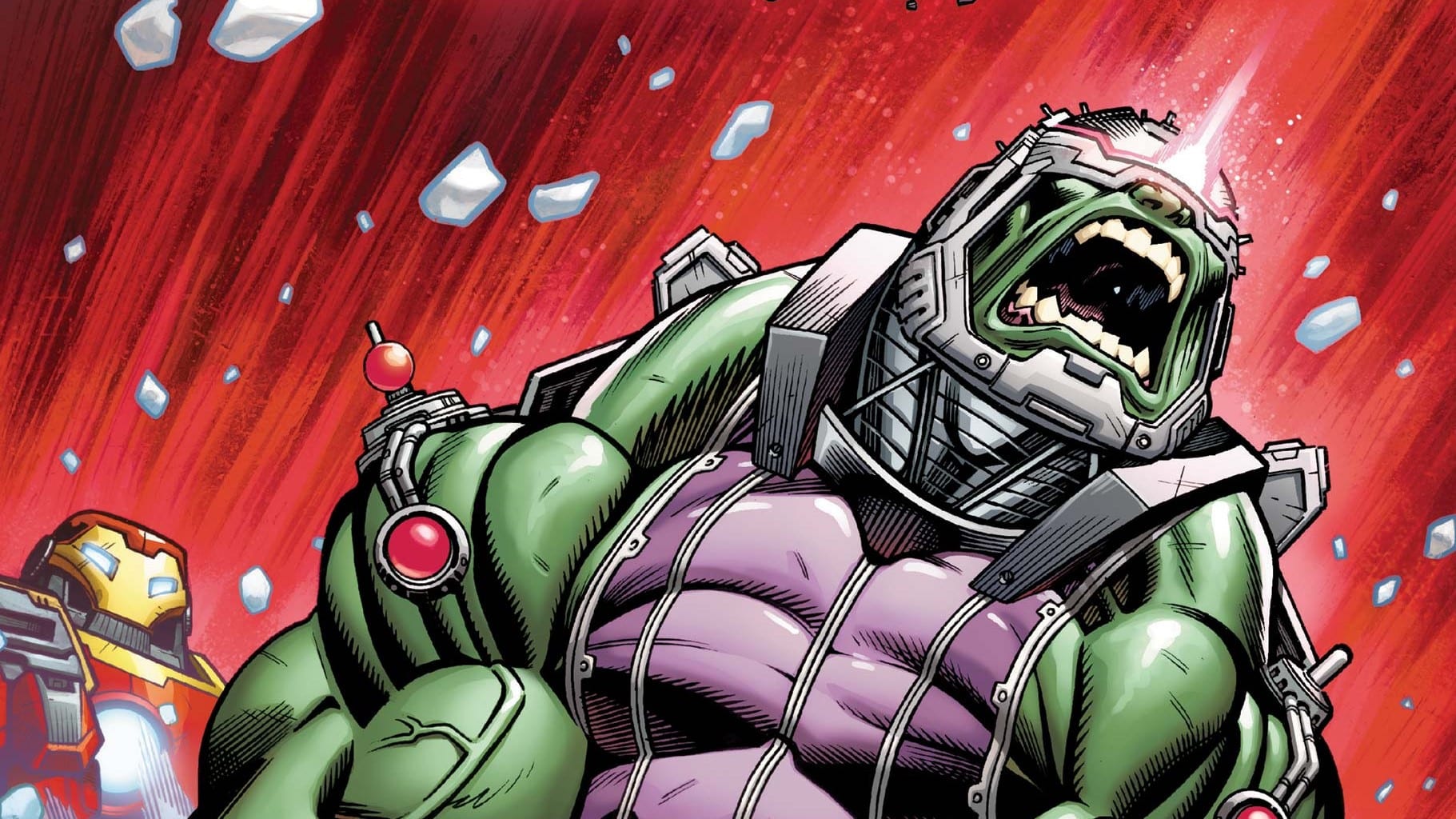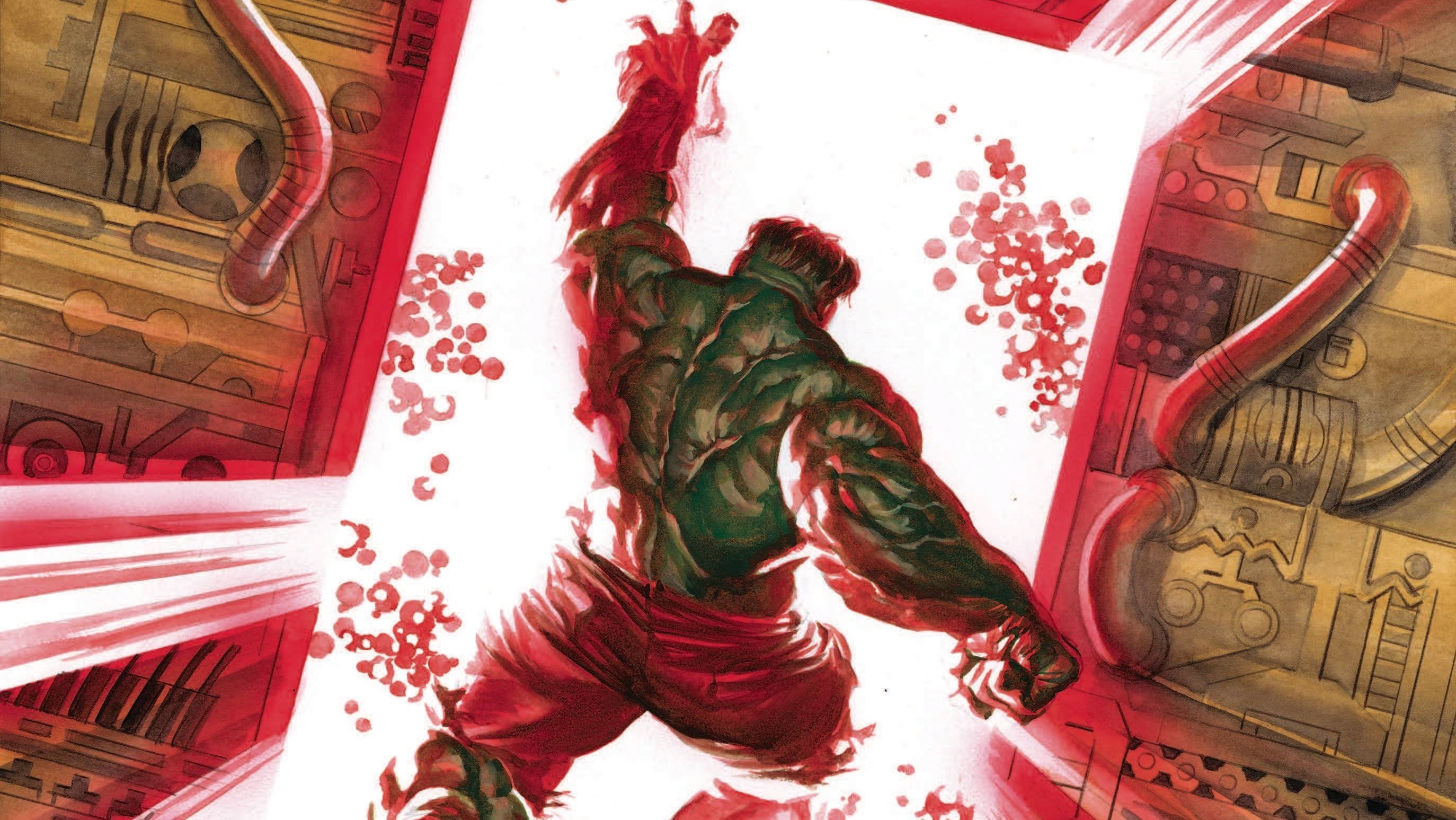The U-Foes bring the fight to our poor weakened Hulk as his haphazard crew make a startling discovery in Immortal Hulk #44 written by Al Ewing, pencilled by Joe Bennett, inked by Ruy José and Belardino Brabo. with colors by Paul Mounts, and letters by Cory Petit.
Cori McCreery: Hiya Zach! Nice to see y’all didn’t burn the place down while I was out.
Zach Rabiroff: Good lord, am I still here? I’ve been trying to find an exit for months. I…I’m so hungry, Cori. But anyway, we have an issue to talk about, so food can wait. (Please feed me, editors. Please.) [Ed. Note: Let’s see how this article turns out first]
Get a Job

ZR: Why, look here, it’s our old friend Job. What have you been up to, buddy? Still shaking your fist at a cruel and arbitrary God whose seemingly endless afflictions seem to serve no purpose in a dark and uncaring cosmos? Oh, you are. Bummer.
Yes, our quote this issue comes once again from the Book of Job (King James translation, naturally), in a passage which reads:
I was at Ease, but he hath broken me asunder: he hath also taken me by my neck, and shaken me to pieces, and set me up for his mark.
It’s clear, at this juncture, that there are certain books and passages that we return to again and again for our issue-opening epigrams. Often, there’s a suggestion that they may be drawn from some significant element of Bruce Banner’s life (we see that both here and in the quotation that gives the issue its title on the closing page, but we’ll get to that later). Just a few issues ago, we saw Joe Fixit sit down with Ben Grimm to hear a humanistic sermon on the Book of Job, as Ben recounted his epiphany that his role in life was to reach out a hand in friendship to those who suffered unjustly. Here, we get a starker and bleaker take on the text; one that suggests the Hulk shouting out against a seemingly endless cycle of suffering and pain that he’s been going through since the first issue of this series. Given the hideous pounding he takes in these pages, it’s not hard to see why. And as a matter of fact, maybe it’s worth asking: is there a purpose to all of this? As we approach the endgame of Al Ewing’s run on this title, is any kind of redemption coming into focus, or is it just endless pummeling all the way down?
CM: It’s certainly getting harder and harder to imagine any sort of happy ending coming out of the end of this story. I’m an eternal optimist, and even I’m having trouble imagining something good for Bruce Banner and the Big Guy here. For forty-four issues he’s been hammered and hammered, and now he’s on the bullet train to hell, and the rails look to be ending in about fifty meters.
ZR: Hell train indeed, Cori. Which is the point, I’m sure – to drag us and the Banners through the most grueling possible circumstances before some kind of hard-earned redemption can pull us all back from the depths. But there’s a part of me that can’t help but see Ewing as the kind of metanarrative God in this Old Testament scenario, meting out vicious punishment for no valid cause except as a pastime for himself and his greedy readers (that’s us!). Something like Grant Morrison’s writer behind the panel in their classic Animal Man run, the ending to which I’ve just gone ahead and spoiled, but without the promise of an apology and reconciliation when this is all said and done. I have enough faith in our writer to believe that there’s a purpose to all of this, and that’s why I’m hanging in here. But, then, Job thought the same thing. And who’s to say either of us were right?
CM: Zach, would you believe that I, consummate DC fan numero uno, have never read Grant’s Animal Man? Whoops. But yeah, there’s just not a whole heck of a lot of time left to pull out of this spiral, and that’s cause enough for concern, but coupled with all the references throughout the series to Job, and you really feel like Hulk might just wind up in the same cosmic punching bag state as that starring character.
The Rules of the Game

ZR: And speaking of cruel gods: who do we find gazing down from on high this issue but That F**kin’ Guy himself, Henry Peter Gyrich. When Gyrich first reared his flattop in this series, I compared him to Victor Hugo’s Inspector Javert, so single-mindedly fixated on his limited vision of law and justice that he loses sight of the moral quagmire into which he falls day by day in pursuit of it. This issue, which is scaffolded by Gyrich’s interior monologue, makes it clear that Ewing seems to feel the same way. As Gyrich himself sees it, he’s a necessary check on the lawless supermen who would otherwise run wild across our planet: “Strict rules are vital to humanity,” he intones. “Take away the rules and humanity will soon follow.” Parse this out a bit, and I think we start to glimpse, underneath the crusty surface, some of the fear that drives this bureaucrat. The warped bodies and chaotic minds behind superheroes and supervillains are strange and foreign to him; they terrify him with their implication that control over order and the universe is never really possible. So he tries to regulate them, and authorize them, and experiment on them beyond all reasonable limits, because it’s the only way he can try to tame the kind of unholy forces he sees all around him. It’s not much of a defense, of course, to say that Gyrich might be a fascist, but he’s a scared fascist. But it’s typical of Ewing’s attention as a writer that even a fairly minor villain like this is given some measure of sympathy for all his undeniable evil.
Still want to see him take a good, solid punch in the jaw, though.
CM: It’s a really good time to be a fan of “These f**kin’ guys,” isn’t it? You’ve got Jamie playing a big role in Excalibur, you’ve got both Hodge and Arcade popping up in Hellions, and then you’ve got this f**kin guy in Hulk. Just f**kin’ guys all over the place, and I love it, because these are the villains I just love to hate. And you say that the fear that Gyrich has gives him a bit of sympathy, but truly fear is at the heart of most fascists. They fear change, and so they usurp power to prevent change. They fear the world that is different from them, and thus they seek to stamp out those differences under their bootheels. In Gyrich’s case it’s a little more palatable, because his fear is a bit more justified, given the actual world threatening powers of some superhumans, but it’s still a fear of evolution, a fear of change, at its heart.
ZR: I think that’s exactly right, and it echoes his most prominent role as a thorn in the side of the X-Men for so many years. It’s compromised, though, by his persistent willingness to embrace and create the kind of violent chaos he’s ostensibly trying to prevent so long as he himself can be in control of it (another way of keeping fear at bay, naturally). So he’s opposed to the X-Men but all in favor of Freedom Force; he’s an enemy of Krakoa but a secret conspirator in Orchis, and over in this title he’s been training the U-Foes to mete out the same savage terror he ascribes to the Hulk. He’s been at it so long, that I suspect he no longer even recognizes the virulence of the hate that’s driving him now. I wonder, though: is redemption for someone like Gyrich possible? Or is he just so far gone that there’s nothing left to be done but smash him down to earth?
CM: And honestly, I don’t want a redemption arc for Gyrich. I don’t believe that fascists of his ilk deserve that opportunity. And it certainly isn’t going to come in the pages of this book, since Ewing’s already transitioned him over to the pages of the other book you cover monthly. You just can’t get enough of Gyrich, can you Zach?
ZR: Listen: I’m not saying that I have a problem going for men I need to change, but I’m not not saying that, either.
But more seriously. The project of bringing order to chaos in the name of fascistic control seems, unfortunately, to be paying dividends in the case of the U-Foes, who deliver a systematic series of assaults to the poor, emaciated Hulk this issue that end in one of the most gruesome scenes of violence in a book that’s offered no shortage of them. And they do it by doing the one thing that always has seemed to elude this team: working together as a united front, instead of a series of feuding and incompatible personalities. Watching them politely take turns at wrecking our hero can be honestly tough to read, but on a narrative level I love it. How often have we seen villains fail simply because, out of narrative convenience, it’s easier to make them petty and jealous of one another in the way the heroes aren’t? So there we have it: Gyrich’s policy works. Shame that he’s still the absolute worst.
Hell is Other Leaders

CM: Speaking of teamwork, and things that work, we got our own little Banner Rescue Squad forming up with Charlene, Jackie, Shaman, Puck and Samson teaming up to try to put an end to the Leader’s madness, and boy do Jackie’s new gamma powers come in handy here. I love how her gamma sight allows both her and the reader to see things in a different light.
ZR: I’m deeply intrigued by this notion of Jackie’s gamma vision, especially in the way it’s going to end up relating to whatever cosmic science Ewing is building up around the nature of gamma radiation here. And I honestly have no idea what he’s up to! First, we got some clues from the Leader regarding gamma as the key to power and resurrection, which might even be tied to everyone’s favorite recently-invented Marvel Universe quantum particle, the primordial kirbon. Then, in this issue, we heard from the U-Foes that gamma radiation seems to be in some way an opposing counter to the cosmic rays that gave both the U-Foes and the Fantastic Four their powers: the Hulk and Leader’s Below to the Fantastic Four’s Above, if you will, perhaps suggesting the Hellish roots of gamma rays. Am I just making all this up as I type? Maybe. But damned if I’m not having fun doing it. Meanwhile, what did you think of our two Hulks’ trip to see the Leader in his natural habitat?
CM: To quote our buddy Joe “Well this ain’t good.” With the Leader controlling the green door, this is undeniably really, really bad for our monstrous hero. Now all of his personalities are stuck down here, and uh, that does not bode too great for anyone. The looming multi-limbed presence of the Leader/One Below, is intimidating and monstrous. And of course it’s here that we get our issue title as well, “To Rule In Hell.”
ZR: Indeed we do. That’s another quote (or, rather, a paraphrase) from Milton’s Paradise Lost, another recurring text in our monthly epigrams. The famous line from which it’s taken reads: “To reign is worth ambition though in Hell: Better to reign in Hell, then serve in Heav’n.” That’s Satan talking, so the advice should probably be taken with a grain of salt. But as many critics have observed, Milton’s sympathies were often drawn toward the Devil, whether or not the author himself would ever concede that fact. And as we’ve already seen in this series, it’s sympathy with the Devil in Milton’s book that first inspired wee little Bruce Banner to adopt the persona of the Devil Hulk to protect him from an abusive father whom he connected with Milton’s God.
So there’s a weird sort of ambivalence seeing Satan connected here not with Hulk, but with the looming, terrifying presence of the Leader, gazing with gamma eyes over his ruined kingdom. It’s a scene that actually reminds me of another vision of Hell from Dante’s Inferno, when we first (and only briefly) get a glimpse of Lucifer himself in Canto XXXIV. Readers encountering Dante for the first time are often surprised and disappointed by how boring his devil turns out to be, just sitting silently and sullenly at the bottom of Hell and munching on some sinners. But that’s exactly it: Satan is boring, because there’s nothing interesting in the empty conquest he’s achieved. He’s destroyed and conquered and spread his evil throughout the land, and all he has to show for it is a cold, empty pit and some lousy humans for a snack. That’s what the Leader’s brand of conquest has brought him, and that’s what the Hulks are charging straight into. Devil help them all.
CM: And frankly, I LOVE Dante’s Satan. (Hey look one of the few Biblical literature references I GET). Just this giant winged beast forever stuck in the pits of his own making forever doomed to punish history’s greatest traitors. I absolutely love the imagery and it’s one of my favorite visions of the Devil.
A Public Service Marvelous Musings
- You might have noticed that neither of us had a word to say about the art this issue. There’s a reason for that. Last month, we grappled with an antisemitic element in the art that was later confirmed to be the addition of Joe Bennett, an artist with a previous history of support for Brazil’s far-right political establishment. Bennett’s subsequent apology, in which he blamed the addition on a combination of a spelling error and an attempted homage to director David Cronenberg, was, to our eyes, insufficient and unconvincing.
- At the same time, we felt as a writing team that the virtues of this series, and particularly the work of writer Al Ewing, were reason enough not to stop reviewing this book altogether. Ewing’s outlook throughout this run has been one of inclusiveness and freedom: whether it was through his presentation of a prominent and heroic trans character, his drawing from a multiplicity of cultural and religious traditions, or his overall message of the Hulk’s heroism being rooted in his fight against those who would oppress and exploit the marginalized. These are things worth recognizing and talking about. Bennett, frankly, is not. So we didn’t, and we won’t. That’s all there is to it.







